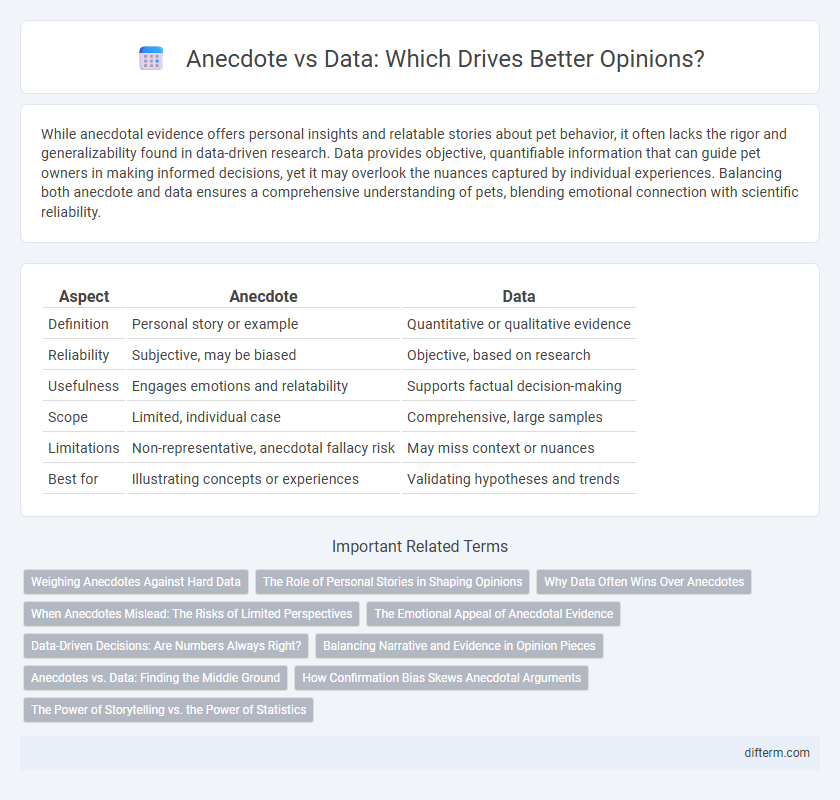While anecdotal evidence offers personal insights and relatable stories about pet behavior, it often lacks the rigor and generalizability found in data-driven research. Data provides objective, quantifiable information that can guide pet owners in making informed decisions, yet it may overlook the nuances captured by individual experiences. Balancing both anecdote and data ensures a comprehensive understanding of pets, blending emotional connection with scientific reliability.
Table of Comparison
| Aspect | Anecdote | Data |
|---|---|---|
| Definition | Personal story or example | Quantitative or qualitative evidence |
| Reliability | Subjective, may be biased | Objective, based on research |
| Usefulness | Engages emotions and relatability | Supports factual decision-making |
| Scope | Limited, individual case | Comprehensive, large samples |
| Limitations | Non-representative, anecdotal fallacy risk | May miss context or nuances |
| Best for | Illustrating concepts or experiences | Validating hypotheses and trends |
Weighing Anecdotes Against Hard Data
Anecdotes provide vivid, relatable insights but often lack statistical reliability, making them less dependable for broad conclusions compared to hard data. Hard data, derived from systematic collection and analysis, offers objective evidence that supports informed decision-making and reduces bias. Balancing personal stories with empirical data strengthens argument validity while maintaining human relevance.
The Role of Personal Stories in Shaping Opinions
Personal stories wield significant influence in shaping opinions by connecting abstract data to human experiences, making complex information relatable and memorable. Anecdotes evoke empathy and emotional engagement, which often drive persuasive power beyond raw statistics. While data provides factual grounding, personal narratives contextualize these facts, transforming them into compelling arguments that resonate on an individual level.
Why Data Often Wins Over Anecdotes
Data often wins over anecdotes because it provides objective, quantifiable evidence that reduces bias and supports decision-making with statistical significance. Unlike personal stories that can be selective or emotionally driven, data offers a broader and more reliable representation of reality. Organizations and researchers rely on data to identify patterns, validate hypotheses, and drive effective strategies.
When Anecdotes Mislead: The Risks of Limited Perspectives
Anecdotes often provide vivid, relatable stories but can mislead by presenting limited perspectives that skew understanding and decision-making. Relying solely on individual experiences ignores broader data sets that reveal consistent patterns and trends essential for accurate conclusions. Prioritizing comprehensive data over isolated anecdotes reduces bias and supports evidence-based opinions.
The Emotional Appeal of Anecdotal Evidence
Anecdotal evidence wields powerful emotional appeal by connecting with audiences on a personal level, making abstract data relatable through individual stories. Personal narratives evoke empathy and strengthen persuasion by engaging readers' emotions, often leaving a more lasting impression than raw statistics. While data provides factual accuracy, the emotional resonance of anecdotes can motivate action and influence opinions more effectively.
Data-Driven Decisions: Are Numbers Always Right?
Data-driven decisions leverage empirical evidence and statistical analysis, offering objective insights that anecdotal evidence often lacks. However, numbers can be misleading if data is incomplete, biased, or misinterpreted, making context and critical thinking essential. Combining quantitative data with qualitative understanding provides a balanced approach to sound decision-making.
Balancing Narrative and Evidence in Opinion Pieces
Effective opinion pieces strike a balance between engaging anecdotes and robust data to enhance credibility and emotional impact. Anecdotes provide relatable stories that capture readers' attention, while data offers objective support that strengthens the argument's validity. Combining narrative elements with empirical evidence ensures opinions resonate persuasively across diverse audiences.
Anecdotes vs. Data: Finding the Middle Ground
Anecdotes offer relatable, vivid illustrations that capture human experience but often lack statistical reliability. Data provides objective evidence and broader trends essential for informed decisions, though it may overlook individual nuances. Balancing anecdotes with robust data ensures compelling narratives grounded in factual accuracy, enhancing credibility and engagement.
How Confirmation Bias Skews Anecdotal Arguments
Confirmation bias leads individuals to prioritize anecdotal evidence that supports their preexisting beliefs, often disregarding comprehensive data that contradicts them. This cognitive distortion results in skewed arguments, as selective storytelling amplifies subjective experiences over objective reality. Reliance on anecdotes fosters polarization by reinforcing biases rather than encouraging critical evaluation of broader, statistically significant information.
The Power of Storytelling vs. the Power of Statistics
Storytelling captivates audiences by embedding data within relatable narratives that evoke emotions and create memorable experiences. Statistics provide objective evidence that enhances credibility and supports decision-making with measurable facts. Combining anecdotal stories with robust data maximizes persuasive impact and strengthens arguments effectively.
anecdote vs data Infographic

 difterm.com
difterm.com